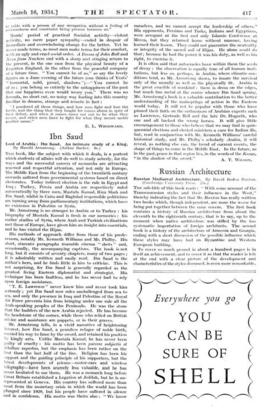Ibn Saud
This book, like the subject with which it deals, is a portent which students of affairs will do well to study soberly, for the ways and the successful careers of monarchs are attracting renewed and respectful attention, and not only in Europe. The Middle East from the beginning of the twentieth century onwards suffered from governmental systems based on direct electorates. Today indirect election is the rule in Egypt and Iraq ; Turkey, Persia and Arabia arc respectively ruled autocratically by three men, Mustafa Kamal, Riza Shah and Ibn Saud, whilst in Cairo and Baghdad responsible politicians arc turning away from parliamentary institutions, which have no existence in Palestine or Syria.
Mr. Armstrong is no stranger to Arabia or to Turkey : his biography of Mustafa Kamal is fresh in our memories ; his earlier studies of Syria, where Arab and Turkish civilizations met those of Europe, have given him an insight into essentials, and he has visited the Hijaz.
His methods of approach differ from those of his prede- cessors, notably Mr. Kenneth Williams and Mr. Philby. His short, staccato paragraphs resemble cinema " shots " and, occasionally, the accompanying captions. The book is not long, but it consists of seventy chapters, many of two pages ; it is admirably written and easily read. Ibn Saud is the author's hero, and he finds little in him to criticize. This is not surprising, for Ibn Saud is generally regarded as the greatest living Eastern diplomatist and strategist. His technique has been faultless, and he has never had to rely upon foreign assistance.
"T. E. Lawrence" never knew him and never took him seriously ; yet Ibn Saud now rules unchallenged from sea to sea, and only the presence in Iraq and Palestine of the Royal Air Force prevents him from bringing under one rule all the Arab-speaking peoples of the Peninsula. He was the stone that the builders of the new Arabia rejected. He has become the headstone of the corner, while those who relied on British advice and assistance are puppets, or in their graves.
Mr. Armstrong tells, in a. vivid narrative of heightening interest, how Ibn Saud, a penniless refugee of noble birth, carried his way to fame by the sword, and retained his position by kingly arts. Unlike Mustafa Kamal, he his never been guilty of cruelty : his motto has been parcere subjectis et 'lebellare superbos, but the emphasis has been rather on the first than the lUst half of the line. Religion has been his support and the guiding principle of his supporters, but the latest developmenti of science—motor-cars and wireless telegraphy—have been scarcely less valuable, and he has never hesitated to uie.them. He was a monarch long before Great Britain established a Legation at Jeddah, but he is un- represented at Geneva. His country has suffered more than most from the monetary crisis in which the world has been plunged since 1929, but his people have suffered in silence and in Confidence.. IBS motto was theirs' also : " We know ourselves, and we cannot accept the leadership of others." His opponents, Persians and Turks, Indians and Egyptians, were arrogant at the first and only Islamic Conference at Mecca, but they returned home without rancour, having learned their lesson. They could not guarantee the neutrality or integrity of the sacred soil of Ilijaz. He alone could do that; because he had the power it was his duty, as well as his right, to exercise it.
It is often said that autocracies have within them the seeds of decay : the observation is equally true of all human insti- tutions, but less so, perhaps, in Arabia, where climatic con- ditions tend, as Mr. Armstrong shows, to insure the survival only of the morally as well as the physically fit. Arabia is the great crucible of mankind : there is dross on the edges, but much fine metal at the centre whence Ibn Saud sprang. Mr. Armstrong's book is a valuable contribution to the better understanding of the mainsprings of action in the Eastern world today. It will not be popular with those who have pinned their faith on the enthusiasm of Arabian experts such as Lawrence, Gertrude Bell and the late Dr. Hogarth, who one and all backed the wrong horses, It will give little encouragement to those who believe that we may find in quin- quennial elections and elected ministers a cure for Indian ills, but, read in conjunction with Mr. Kenneth Williams' careful historical study, and Mr. Philby-'s scholarly Arabia, it will reveal, as nothing else can, the trend of current events, the shape of things to come in the Middle East. In the future, as in the past, peace in that region lies, in the words of the Koran,










































 Previous page
Previous page